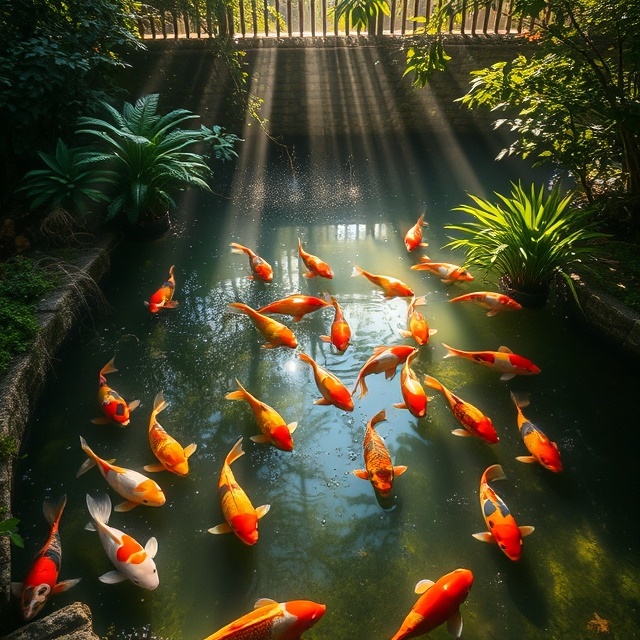Koi fish are beloved for their beauty, elegance, and cultural significance. Keeping koi can be a rewarding experience, but it requires careful planning and attention. For beginners, understanding the basic principles of koi care is crucial to maintaining healthy and vibrant fish.
Choosing the Right Koi
When selecting koi, it’s important to choose fish that appear active and healthy. Look for koi with bright, clear colors and smooth, unblemished scales. Avoid fish that seem lethargic, have damaged fins, or show signs of illness such as discoloration or abnormal swimming behavior.
Building the Perfect Koi Pond
A well-designed pond is essential for koi fish to thrive. Here are some factors to consider:
- Size and Depth
Koi fish grow large, often reaching lengths of 12 to 24 inches. A pond should be at least 1,000 gallons in volume and 3-4 feet deep to accommodate their size and provide enough space for swimming. - Water Quality
Clean, well-oxygenated water is crucial. Install a high-quality filtration system to remove debris and maintain optimal water conditions. Test the water regularly to ensure appropriate pH levels (6.5-8.0) and ammonia, nitrite, and nitrate levels. - Shelter and Plants
Koi appreciate shaded areas to protect them from direct sunlight and predators. Adding aquatic plants like lilies can provide shade while enhancing the pond’s aesthetic. - Seasonal Considerations
Koi are hardy fish but require extra care during extreme weather. In cold climates, ensure the pond doesn’t freeze entirely, and in hot weather, provide aeration to prevent oxygen depletion.
Feeding Your Koi
Koi have specific dietary needs based on their age, size, and the season:
- High-quality pellets: These are a staple diet for koi, providing essential nutrients.
- Seasonal variations: During warmer months, feed koi more frequently with protein-rich food to support growth. In cooler months, reduce feeding and switch to wheat germ-based food to aid digestion.
- Supplemental treats: Koi enjoy fruits, vegetables, and even shrimp as occasional treats.
Overfeeding can harm both the fish and the pond environment, so provide only what they can consume in a few minutes.
Common Health Issues
Koi fish can face health challenges, often caused by poor water quality, stress, or infections. Common problems include:
- Parasites: Visible spots, erratic swimming, or scratching against surfaces may indicate parasites.
- Fungal infections: White, cotton-like growths on the skin or fins often result from fungal infections.
- Swim bladder disease: Difficulty maintaining balance while swimming may signal issues with the swim bladder.
Address these issues promptly by consulting an aquatic veterinarian or a koi care expert.
Interacting with Your Koi
Koi are social and intelligent fish that recognize their owners and can even be hand-fed. Regular interaction helps build trust and allows you to monitor their behavior and health.
Conclusion
Caring for koi fish is a fulfilling hobby that combines the beauty of nature with personal responsibility. By providing a suitable pond, maintaining water quality, and ensuring proper nutrition, you can create an environment where your koi thrive for years to come. With patience and dedication, koi keeping becomes a rewarding experience that brings peace and joy to your life.

